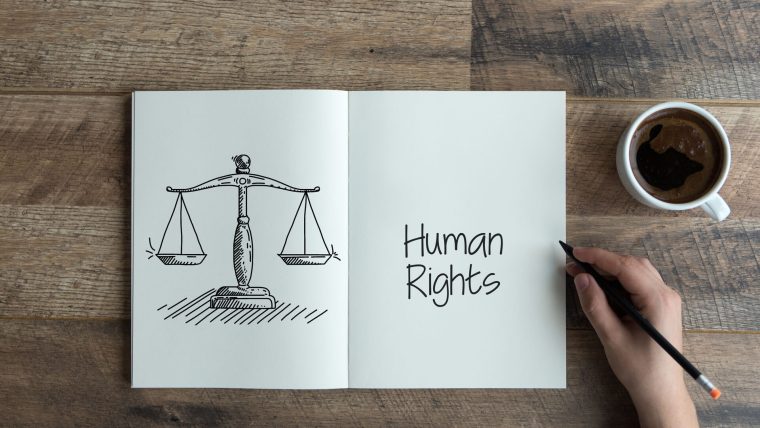| Rank | School | Location |
|---|---|---|
| 1 | Columbia University In The City Of New York | New York, NY |
| 2 | Yale University | New Haven, Connecticut |
| 3 | Cornell University | Ithaca, NY |
| 4 | University of Chicago | Chicago, IL |
| 5 | New York University | New York, NY |
| 6 | University of California, San Diego | San Diego, CA |
| 7 | American University | Washington, D.C. |
| 8 | University of Notre Dame | Notre Dame, IN |
| 9 | Johns Hopkins University | Baltimore, MD |
| 10 | University of Pennsylvania | Philadelphia, PA |
This is a ranking of the 10 best Human Rights Studies programs in the US.
This ranking is designed for students to make informed college and degree decisions when selecting a Human Rights Studies program.
Human Rights Studies are often interdisciplinary, and include subjects such as History, Anthropology, Political Science, Bio-Ethics, Law, Religion, and Sociology.
The ranking is based on criteria most important to college students, and to each school's academic influence in Human Rights Studies. For more information about our objective ranking methodology see our College Calculator.
2021 Country Reports on Human Rights Practices

The Best Human Rights Studies Programs
Columbia University In The City Of New York
New York, NY
The Graduate School of Arts and Sciences offers graduate programs in the humanities and social as well as natural sciences, and issues all of the university's PhDs. Several partnerships with prominent New York establishments expand the offerings and opportunities available to Columbia students.
The Human Rights Studies Master of Arts program takes an interdisciplinary approach to focusing on an academic perspective as well as the practical and theoretical elements of human rights.
Multiple departments within the Graduate School of Arts and Sciences participate in the program through course offerings, and students may take several courses from other schools within the University.
Credit requirements: 30 credits; students must complete a thesis
Selection of required courses:
- Introduction to Human Rights
- Human Rights Research Seminar
- International Human Rights Law
- Thesis
Learning enrollment options: Part-time or full-time
Start dates: Fall
Admissions and transfer credit information: Applicants submit a standard application, as well as a Statement of Academic Purpose, academic writing sample, two letters of recommendation, transcripts, and proof of English proficiency if applicable.
During their first semester, students may apply for up to 15 transfer credits using graduate-level classes previously taken at Columbia University that did not contribute to a degree. Admissions does not accept outside courses for transfer.
Accreditation: The Middle States Commission on Higher Education provides accreditation for Columbia University.
Yale University
New Haven, Connecticut
The Orville H. Schell, Jr. Center for International Human Rights encourages students to find the practical application of their current academic learning in the arena of human rights.
The Center serves to prepare lawyers and professionals with the needed skills and knowledge to support the advancement of international human rights, to support relevant non-governmental agencies, and to add to the understanding and knowledge base surrounding human rights issues.
The Multidisciplinary Academic Program in Human Rights allows students to take an interdisciplinary approach to understanding the multi-faceted issue of human rights. The program focuses on growth that occurs outside the classroom and fosters community among its participants.
Credit requirements: 6 courses
Selection of required courses:
- Human Rights Theory and Politics
- Advanced Human Rights Colloquim
Students participate in this program in addition to full-time undergraduate work in a degree program.
Program length: Begins Spring of sophomore year and ends with the capstone course during the Fall of Senior year
Admissions and transfer credit information: Existing undergraduate students apply for the program during Fall of sophomore year.
Accreditation: The New England Commission for Higher Education provides Yale University with accreditation.
Cornell University
Ithaca, NY
The College of Human Ecology adds research and public engagement alongside education as the foundation of its programs. The College has stronger interdisciplinary ties as well as a translational approach.
The Cornell Institute for Public Affairs (CIPA), the program yielding Cornell's Master of Public Affairs degree, offers a concentration in Human Rights and Social Justice. CIPA focuses on combining education with practical, hands-on experience, which feeds into all concentrations.
The Human Rights and Social Justice Concentration focuses on political and economic barriers to the universal, legal, and cultural application of human rights and the end of discrimination on any basis.
Equipped with this knowledge, students are prepared to take on roles as advocates against social, political, and economic inequality.
Credit requirements: 43 credits as well as practical experience and a capstone project, thesis, or professional report.
Selection of required courses:
- Ethics, Development, and Globalization
- The Politics of Inequality
- International Organizations and International Human Rights
- Gender and Sexual Minorities
- Race and Public Policy
Learning enrollment options: Full-time
Program length: Two Years
Start dates: Fall
Admissions and transfer credit information: Applicants complete an application and submit unofficial transcripts (admission requires official transcripts before coursework begins), GRE scores, a resume, three letters of recommendation, a statement of purpose, and an essay.
Transfer students receive an official evaluation within 10 days of admission.
Accreditation: Cornell University receives accreditation from the Middle States Commission on Higher Education.
University of Chicago
Chicago, IL
The Pozen Family Center for Human Rights at the University of Chicago promotes interdisciplinary research and education to pursue the practice and theory of human rights around the world.
The Center focuses on combining research with direct training and offers a range of opportunities to students, including a semester abroad in Vienna and summer internships with relevant organizations.
The minor in Human Rights is open to any undergraduate student, and is flexible enough to align with various majors and support subsequent graduate and professional work in fields that may include human rights as an area of concern.
A graduate Certificate in Human Rights Studies is also available to doctoral students who take three courses and write a major research paper in the field, as well as being an active participant in the Pozen Family Center for Human Rights.
Credit requirements: 5 courses
Selection of required courses: Students may choose from a range of courses to meet requirements. They choose one from the following options for their introductory course:
- Human Rights: Contemporary Issues and Concepts
- Human Rights: Philosophical Foundations
- Human Rights: History and Theory
- Human Rights course offered in a semester abroad in Vienna
Admissions and transfer credit information: Students apply for a minor by Spring Quarter of their third year and need approval from the Pozen Center Executive Director. Students must take the majority of courses at the University of Chicago; transfer credits are subject to University policy.
Accreditation: The Higher Learning Commission of the North Central Association provides the University of Chicago with accreditation.
New York University
New York, NY
The Law School at New York University offers 16 areas of study and is a leader in legal education in the United States. The Law School is committed to maintaining global opportunities for its students and offering as much variety as possible in the field of law and business. As part of its commitment to public service, students can participate in clinics and may receive funding for working with pertinent organizations.
The Master of Laws in International Legal Studies offers a broad range of potential topics for student study, including, of course, Human Rights.
In collaboration with the Robert L Bernstein Institute for Human Rights, students pursuing the degree have the opportunity to grow outside the classroom by collaborating with faculty on research, participating in clinics, and getting involved in work in university centers.
Credit requirements: 14 credits in course topics, as well a number of recommended courses.
Selection of required courses: Course topics fall into the categories of
- International Law
- Comparative and Foreign Law
- International Litigation and Arbitration
These offerings vary by semester and therefore have no set requirements during the program. Full-time students may pursue a four-credit thesis option as well.
Program length: One year
Admissions and transfer credit information: Applicants submit an application as well as a personal statement, resume, Official transcripts of their previous education, especially of their Juris Doctor, and recommendation letters.
Accreditation: New York University Law School receives accreditation from the American Bar Association as well as the Middle States Commission on Higher Education.
University of California, San Diego
San Diego, CA
Eleanor Roosevelt College at the University of California, San Diego accepts students in any field and provides an international aspect to their education. The college offers a core curriculum designed to expand students' horizons, activities and international opportunities, and a minor in International Migration Studies as well as Human Rights.
The Human Rights minor invites students to investigate human rights intellectually and practically. The program lends focus to the origins, history, progress, and implementation of human rights as well as the effects of these changes.
The moral questions and many obstacles that arise during this process provide further topics of study. Courses are largely international in focus, but several deal with the United States or have a comparative approach.
Credit requirements: 28 units
Selection of required courses:
- Introduction to Human Rights and Social Justice
- Contemporary Issues
Admissions and transfer credit information: The minor is open to all undergraduate students at the University of California, San Diego. They must be able to complete the minor without excessive requirement overlap or exceeding the Maximum Unit Limitation.
Accreditation: The Western Association of Schools and Colleges Senior College and University Commission provides the University of California, San Diego with accreditation.
American University
Washington, D.C.
The Academy on Human Rights and Humanitarian Law in American University's Washington College of Law seeks to forge bonds across cultures and institutions to better promote human rights and to prepare and empower those who will work to defend those rights.
The Master of Laws in International Human Rights and Humanitarian Law program provides specialized training in international human rights. The program boasts expert AUWCL faculty, including 40 international experts in the field and offers over 50 courses. Given proper course selection, students can prepare for New York State bar as part of the LLM degree.
The Academy also has the Program of Advanced Studies on Human Rights and Humanitarian Law, a three-week summer gathering of international participants offering 19 courses.
Students in both the LL.M. and summer program have the opportunity to interact with judges of the International Court of Justice (ICJ), the Inter-American Court of Human Rights, Special Rapporteurs and Committee members of United Nations, members of the Inter-American Commission on Human Rights, and experts from prominent NGO's.
Credit requirements: 24 credits
Selection of required courses: Offerings vary between residential, hybrid, and online programs
- Human Rights Law
- Advanced Human Rights Law
Other elective courses include:
- Women and International Human Rights
- Vulnerable Groups
- Regional Approaches to Human Rights
Learning enrollment options: Full- or Part-time
Program length: 2 or 3 semesters full-time; up to 5 years
Admissions and transfer credit information: Applicants to the Master of Laws program must already possess a US-accredited Juris Doctor (or equivalent). Potential students submit an application, transcripts, a personal statement, and 2 letters of recommendation. The Master of Laws program does not accept transfer credits.
Accreditation: American University's Washington College of Law receives accreditation from the American Bar Association.
University of Notre Dame
Notre Dame, IN
The University of Notre Dame Law School is the oldest Roman Catholic Law School in the country. The school encourages students to grow personally, spiritually, and socially as they develop academic and professional abilities that they can utilize to improve the world around them.
The Master of Laws in International Human Rights equips those who already have a passion for serving victims of human rights violations with the necessary theoretical background and technical skills to be effective in their legal defense of those individuals.
The curriculum places a heavy emphasis on international human rights law, ensuring that graduates can combine their best intentions and serve their communities with a thorough knowledge base and strong competency.
Credit requirements: 24 credit hours
Selection of required courses:
- International Human Rights Research and Writing
- Foundations of International Human Rights Law
- Accountability for Gross Human Rights Violations
- Human Rights Practice
- Regional Human Rights Protection
Program length: 1 year
Admissions and transfer credit information: Applicants need to possess a JD from an American Bar Association approved school or a Bachelor's Degree in Law from an accredited school. Along with an application, students submit a resume, personal statement, and three letters of recommendation.
Accreditation: Notre Dame Law School receives accreditation from the American Bar Association.
Johns Hopkins University
Baltimore, MD
The Bloomberg School of Public Health at Johns Hopkins University has a proud history of advancing the field of medical science by researching, educating, and implementing new ideas in the field. There are currently 10 departments within the University.
The Health and Human Rights Certificate fosters an understanding among healthcare professionals of the link between human rights (and having them respected) and support of public health.
Additionally, faculty prepare students to document human rights violations they encounter during their healthcare career, and encourage students to familiarize themselves with human rights legislation from other regions and nations so as to be better prepared to speak to them and address their impact on public health.
Credit requirements: 18 credits
Selection of required courses:
- Academic & Research Ethics
- Public Health and the Law
- Assessing the Epidemiologic Impact of Human Rights Violations
- Human Rights in Public Health Practice
Learning enrollment options: Flexible
Program length: Within three years
Admissions and transfer credit information: Current graduate and nursing students at John's Hopkins University are eligible to apply for the Health and Human Rights certificate. The student's adviser will email the certificate directors with pertinent information in order to apply.
Accreditation: The Bloomberg School of Public Health at Johns Hopkins University receives accreditation from the Council on Education for Public Health.
University of Pennsylvania
Philadelphia, PA
The Law School at the University of Pennsylvania focuses on a cross-disciplinary approach, producing graduates who are competent in a field that might need legal assistance as well as thoroughly knowledgeable about and capable in practice of the law, making them more effective in professional practice.
The Global Institute for Human Rights certificate is a week-long summer program involving a variety of speakers and discussions on current Human Rights topics and issues. Graduates as well as undergraduate students attend to be prepared for a future in advocacy or to gain a broader awareness and understanding of Human Rights issues.
Speakers are currently active advocates who come to share with those who will come after them. At the completion of the conference, faculty and staff present participants with a certificate of completion.
Credit requirements: Attendance at week-long summer conference.
Selection of sessions from the 2019 program:
- Human Rights, Treaties, Women, Peace and Security Agenda
- Gender Equality as Prevention of Violent Extremism
- Acid Crimes
- Work on the Ground: Guantanamo Bay
- Labor Trafficking
- Intersectionality: Disability Rights
- History of Human Rights at the UN
Learning enrollment options: Five eight-hour days
Program length: Five days
Start dates: Summer
Admissions and transfer credit information: The University accepts applications from current students and professionals with an interest in Human rights. The early application deadline falls in January, the final, in May.
Accreditation: The Middle States Commission on Higher Education provides the University of Pennsylvania with accreditation.
Ranking Guidelines
In selecting the schools to be included in this ranking, we looked at the schools that are most influential in the subject of Human Rights Studies at AcademicInfluence.com. Successful Student then added our own criteria to make the final selection and ranking of the schools: the quality of the programs and courses available, the faculty involved, awards, rankings, and overall academic reputation. Academic Influence uses a proprietary method of determining the influence that college academics and alumni have had in Human Rights Studies.


